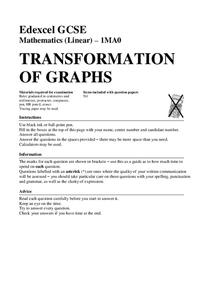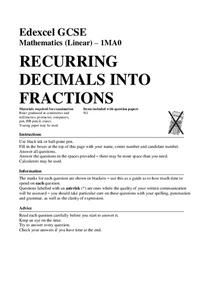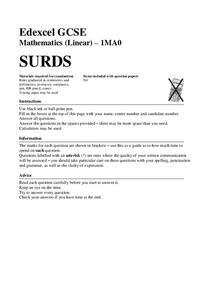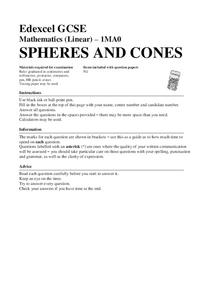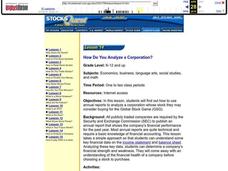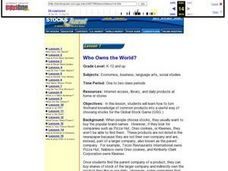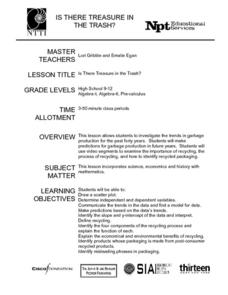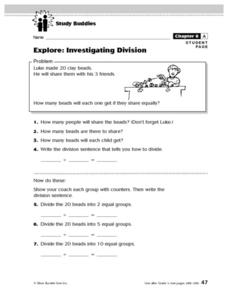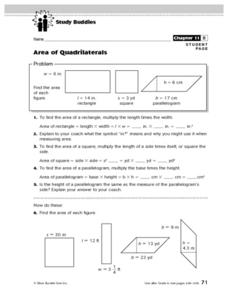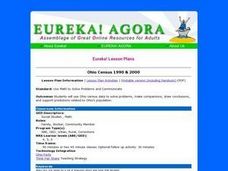Mathed Up!
Simultaneous Equations with a Quadratic
Viewers discover how to solve quadratic-linear systems with a video that first explains the substitution method for solving a system of equations involving a quadratic. Scholars then complete a worksheet of practice problems.
Mathed Up!
Transformation of Graphs
In what ways can you transform a graph? An engaging video answers this question as it covers reflections, translations, and stretches of graphs. To test their knowledge, individuals complete a set of problems to apply this knowledge.
Mathed Up!
Sine and Cosine Rules and Area of Triangles
Learners discover how to find missing sides and angles using trigonometry. Scholars first watch a video covering the Law of Sines and Cosines, as well as the area formula for a triangle. To test their knowledge, they complete a worksheet...
Mathed Up!
Recurring Decimals
Explore how to convert repeating decimals to fractions with an informative video that teaches young mathematicians how to translate between decimals and fractions. After viewing, individuals complete a set of problems to practice...
Mathed Up!
Surds
Young mathematicians learn how to simplify expressions with square roots by watching a video that shows several ways to rewrite expressions involving radicals. They work on questions where they rationalize denominators and expand and...
Mathed Up!
3-D Pythagoras
Apply the Pythagorean Theorem in three-dimensional shapes. Young mathematicians watch a video that takes them through several examples of using the Pythagorean Theorem to solve problems involving lengths in three-dimensional figures. A...
Mathed Up!
Spheres and Cones
Class members learn how to apply formulas for spheres and cones with a video that begins with a review of the formulas for surface area and volume of spheres and cones. Pupils use these formulas to solve problems on a worksheet.
Curated OER
Algebra 1: Simplifying Radicals
After discussing the difference between rational and irrational numbers, the class pratices simplifying, adding, and subtracting radical expressions. They play a game which involves passing around cards until they have matching hands of...
Curated OER
Simplify Radicals
Learners are introduced to the concept of radicals and how to use them in various situations. They review rational and irrational numbers while simplifying different number sentences. They also practice factoring perfect squares.
Curated OER
It's in Your Pocket
Learners examine American coins. In this American currency lesson, students study how American money came to be as well as the responsibilities of the U.S. Mint. Learners discover details regarding American coins and design their own coins.
Curated OER
How Do You Analyze a Corporation?
Students find out how to use annual reports to analyze a corporation whose stock they may buy for the Global Stock Game. They read the investor information section, which provides detailed information about the company's products and...
Utah Education Network (UEN)
It's All Just Similar to Me
Middle schoolers explore the concept of similar figures. In this similar figures lesson, pupils calculate scale factors of similar triangles. They find missing sides of triangles, and measure angles using protractors and measure sides of...
Curated OER
Lesson 1 Who Owns the World?
Students experience how to turn firsthand knowledge of common products into a useful way of choosing stocks for the Global Stock Game. They engage in a simulation of buying stocks.
Curated OER
Lesson 3 How Do You Read Stock Quotes Online ?
Students understand how to get and interpret stock price data online. They describe certain aspects of various corporations and know the meanings of important terms involving the stock market.
Curated OER
Class of Gold
How can you see a number in nature? Here, learners discover both Fibonacci numbers and the golden ratio by exploring a number of different resources. Note: Some of the resources are older and may be missing some of the links, but...
Curated OER
Is there Treasure in Trash?
More people, more garbage! Young environmentalists graph population growth against the amount of garbage generated per year and find a linear model that best fits the data. This is an older resource that could benefit from more recent...
Curated OER
Computing Indefinite Integrals
Provide your students with a framework for introducing indefinite integrals. It takes into account a learner’s prior knowledge of slope fields and definite integrals and uses the notion of an antiderivative to give them an intuitive...
Curated OER
What's in a Shape?
Students explore characteristics of shapes by making and using tangram sets. They discover how the tangram pieces are related to one another, and determine how many different combinations of the triangles, squares, and parallelograms in...
Curated OER
Explore: Investigating Division
In this exploring and investigating division worksheet, young scholars, working with a partner, study and answer seven clues to exploring and investigating division equations.
Teacher Created Resources
PEMDAS: Order of Operations
Learners complete algebraic equations. They learn the algebraic order of operations and the acronym, PEMDAS, to help them remember the correct order of operations. Pupils complete algebraic equations using the order of operations.
Curated OER
A Pocketful of Change
Students study the meaning, symbolism, and value of U.S. coins,
especially the quarter. They conduct a survey of coins in students'
possession, graphing the results to show frequency distribution and drawing
inferences about the U.S....
Curated OER
Retirement: Show Me the Money!
Students explore the concept of retirement finances. In this retirement finances lesson, students discuss what it means to save, invest, risk, or the time value of money. Students play the stock market game. Students interview a parent...
Curated OER
Area of Quadrilaterals
In this math worksheet, young scholars read an informative chart about how to find the area of quadrilaterals. Students then answer 6 questions in which the area of quadrilaterals is calculated.
Curated OER
Ohio Census 1990 & 2000
Pupils use Ohio census data to solve problems, make comparisons, draw conclusions, and support predictions related to Ohio's population. They interpret and work with pictures, numbers and symbolic information.

